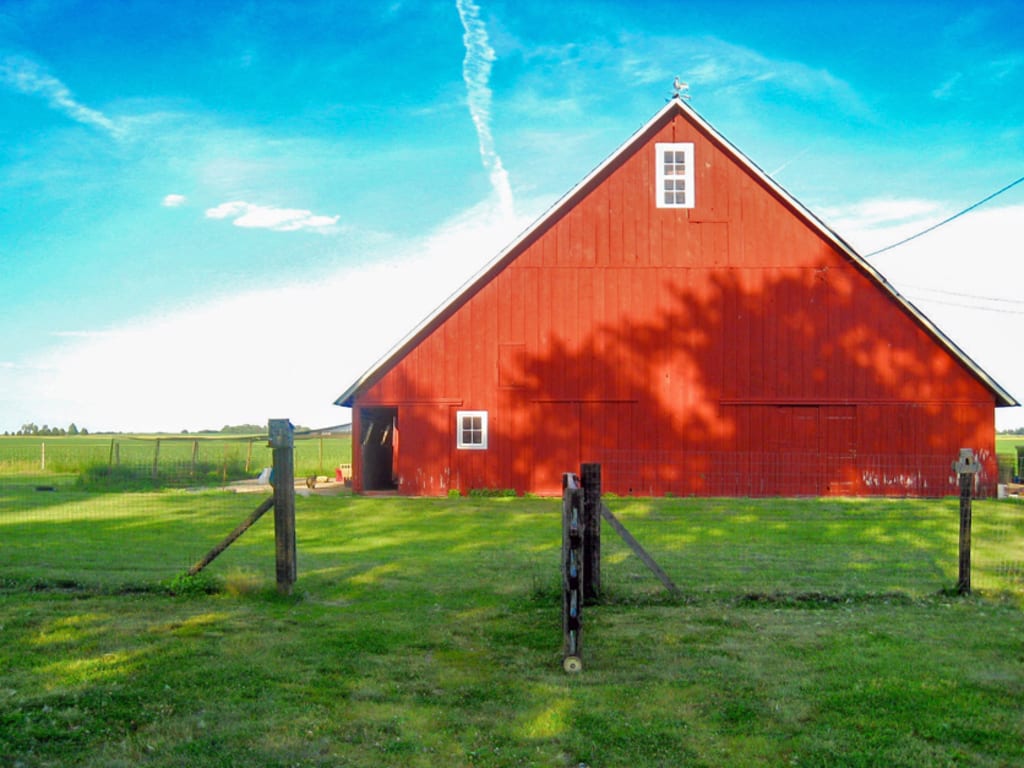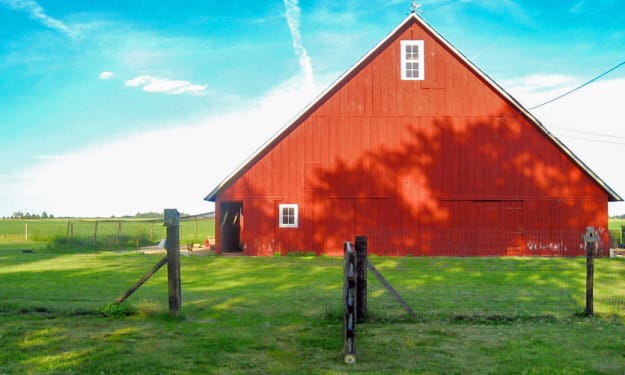
The smell, Ansel blindly supposed to himself, was always the thing he dreaded most. The thought slipped listlessly in and out, as the twinge of guilt he always felt at such times nagged at him gently. Ansel was earnestly, if not a little gravely, aware of his good fortune. Most of his brother’s and sister’s chores on the farm were a great deal more grim; and that was putting it lightly, he thought glumly. Nonetheless, his job was quite simple, and not entirely unpleasant if he was being completely honest. He was in charge of swatting down the cobwebs from the simple wooden slatted rafters that covered the porch that surrounded a little less than half of the cattle pen. Then he was to wash the windows that did completely surround the slaughterhouse.
While these two jobs were tedious, Ansel supposed he liked it that way, spending the majority of his day in a bliss of silence. This was a drastic change from the five bedroom ramshackle farmhouse the eight of them shared. With only two bathrooms (if you’d like to call them that,) and the constant loud bickering that was seemingly incessant in their home, the time he spent lazily dragging an old extending mop handle with a chunk of rag tied onto the end through the rafter slots, had come to be the highlight of his day.
He didn’t mind that the pole was frayed and chipped and so old that it bowed in and out dangerously with the slightest movement. He also didn’t REALLY mind filling and dragging the vat sized steel basin, he thought, heavy as it was. He supposed he would, in fact, miss it. He made sure to take extra care today, very deliberately and slowly trudging up the few splintered steps that stood between him and the point he routinely began jabbing the teetering pole up into the rafters. He tried to focus particularly hard on rousting the spiders and cobwebs and various
2 / 6
assorted bugs that had collected; this would not remain his chore for very long after all, and he wanted to leave it in a state of cleanliness that would make his mother proud.
While he had not yet been born, (having been barely winked into existence in his mother’s womb at the time,) he was painfully aware that most people did not even SURVIVE the attacks, let alone in any fashion that could sustain life as they had. His mind vaguely waved over that it was too bad he had never met his father, but his mother had told him that when the sirens finally DID begin to trill their foreboding wail through the air, it was their father who was responsible for the eight of them surviving. As he untied the dusty and cobwebbed cloth from the tattered pole to shake it out, he recalled how his mother had said they had been so prepared, far more prepared than most, she had said in a voice hardly above a whisper as she tucked him in one evening. What they hadn’t prepared for, she had sighed, was something as simple and unpredictable as the latch on the inside of the cold cellar (now bomb shelter) malfunctioning.
That his father had stayed in the oiled and dirt stamped cellar, holding the latch from the outside shut with his hands while his mother screamed and cried hysterically; screamed so furiously that she had been unable to speak for two days afterwards, tearing two of her fingernails down to the bleeding quick clawing at the roughly insulated door that her husband had so carefully constructed, would remain unknown to him. As the aircraft carriers had boomed overhead, each in turn dispensing their cargo of noxious thick gas in softly billowing plume, she began to listen. She listened as her husband began to scream, and as he sucked poison in with huge gasping breaths, his screams dissolved into a garbled choking noise that had then abruptly ceased.
Much like her youngest son, Margaret often thought to herself how others had it worse. That thought alone had damped down her pain on the occasions when it seemed to swell around her, threatening to swallow her whole and drown her. Ansel would never know these
3 / 6
contrite details because his mother firmly believed it was her burden to carry alone. He dimly realized he finished with all the visible rafters and frowned slightly; that smell. It was only the one window, he thought glumly. The one window directly next to the hinged swinging slaughterhouse doors. He drew in a deep breath and closed his eyes and he slowly exhaled. It would not bother him today. It COULD not bother him today. Today was the day he would join his older siblings with the “grown up” cores. As he plunged the large sponge into the bucket of soapy water, he racked his brain for the advice his oldest brother Jerome had volunteered to him the night before last, as he lay firmly tucked into his bed.
Ansel knew that his family’s farm was one of the only to survive the attacks. The biochemical bombs that had decimated the people, animals, and earth itself alike, had left everything vital in short supply. They were forced to collect, distill, and purify their own water from either the occasional sparse rainfall, the droplets his sister collected in her makeshift greenhouse, or (he grimaced) the collected buckets of their urine on several desperate occasions. The soil, which seemed to have simply given up on life, gave birth to what was barely enough sustenance for even just his small family to reap for both themselves and the cattle. His mother and siblings alike had explained how lucky they were. Lucky that they should have the ability to provide actual meat, meat that was so absolutely valuable and scarce, for both themselves and in trade to the local “market” for their various necessities. They explained that because of this, the process of caring for and slaughtering the cattle was of the utmost importance, particularly in this new and barren world.
He continued to absentmindedly drag the wash basin from window to window, dimly aware of the fact that he was approaching the slaughterhouse door now, the door and the smell. That cloying aroma of iron, and dirt, and something else. Something so faint but so unpleasant and ever present, lurking beneath the smell of the blood matted earthen floor of the barn. Death, he supposed. It was the smell of death. He steeled himself as he slowly swiped the last streak of grime away from the
4 / 6
second to last barn window. He would NOT allow the smell to bother him, could not, he had decided. As he stood at the window, soaping it just as carefully as the others, he was pleased to note that the smell really wasn’t bothering him. It was, in fact, barely noticeable in the dry hot morning air. He allowed himself to smile pleasantly as he worked, taking care to pinch the rag into a small twist so as to work it into the corners of the rough panes. After all, he reminded himself, he wanted to make his mother proud.
When the last smudges and streaks had finally been whisked away, he tucked the now damp and dirtied rag into his back pocket unconsciously, and stood directly before the swinging doors. The barely noticeable breeze caused the doors to rock inwards and outwards randomly in an uneven fashion. The hinges creaking ever so slightly with each ebb and flow of the doors and wind. He pushed the door open and his brother Jerome glanced over and his face broke into a brilliant and genuine grin that transformed his work weary face. He motioned for Ansel to come over to where he was standing.
“How’s the chores goin’ Cinderella?” Jerome said amiably while rustling his little brother’s hair with one rough hand. “Good I guess, I’m all done.” Ansel quietly and smilingly answered back. Looking from his brother’s handsomely sculpted face to the floor, and then to cattle that was hunkered down and tied to the cattle stand with a hank of old rope. “Do you want to help? S’pose you’re allowed to now that you’re gettin so old, huh?” He looked down at his younger brother with eyes that shone with love. Ansel nodded furiously, determined to be tough for his brother. “Good. Now watch carefully squirt.”
He picked up what appeared to be some sort of crossbreed between a small pick axe and a ball peen hammer. He knew from his brother Phillip, who was undoubtedly the most intelligent of them all, that this “hammer” had ball bearings in it. “This was” he explained patiently to Ansel, “so that no matter how hard you brought the hammer down it simply would not recoil.” He had gone on further to explain that this was important because if you were to hit even just one inch to the left or right of where the “sweet spot” was, (Ansel hated this term,” then the hammer could come flying
5 / 6
back into your face. Then Phillip had taken his thumb of his right hand and stuck it out of this balled fist, drawing it dramatically in a line from under his left ear to under his right.
He watched intently as Jerome took the “hammer” and held it hovering over a spot slightly upwards and to the right of one cream colored ear. He brought it up slowly and then expertly brought it down in one graceful and powerful arc. It landed perfectly placed with a deep wet thump, that caused Ansel to jump slightly. He began to sweat slightly as he realized that he didn’t know exactly what Jerome had meant by “help.” He stared up at his brother anxiously awaiting his directions. He was, he noted, more than slightly relieved when all his brother did was gently kneel down and unclasp what appeared to be a threadlike simple gold chain by the clasp from the cattle’s neck. He took a small rag from out of the breast pocket of his dirt and blood splattered chambray work shirt and wiped gently at something in his hand that Ansel couldn’t entirely see.
Jerome held it out to his brother, to which Ansel put out one small hand, palm upturned. His brother dropped a small, gold, heart-shaped locket into his unusually clean hand. The delicate chain it was on glittered in the mote filled random rays of sun that shone through the uneven slats of the slaughterhouse roof. “Run this up to Ma for me will ya?” Ansel nodded, happy to have been tasked with something mundane (for the time being at least, he thought.) He turned and gently pushed his way through the double doors, slightly aware of the creaky swishing they did as he passed through them. He noticed there was a small clasp on the heart shaped capsule of the locket and hooked one tiny and neat fingernail into it, popping it open gently. Inside were two terribly faded and dime sized photos, each nestled within opposing sides of the locket.
One, he noted was a strikingly handsome man. He was darkly complected with thick dark hair and glistening onyx eyes. The opposing side housed a picture he had to squint and hold close to his face to make out entirely. It was a picture of the cattle and what he assumed was the offspring of the handsome man and herself. She held a chubby infant who had the thick course black hair and Levantine skin of the man, but the unmistakably denim blue eyes of the cattle. He pondered the
6 / 6
locket for a moment longer before wrapping his fist firmly around it and breaking into a run for the house and his mother. He hurried, knowing how proud she would be.






Comments
There are no comments for this story
Be the first to respond and start the conversation.